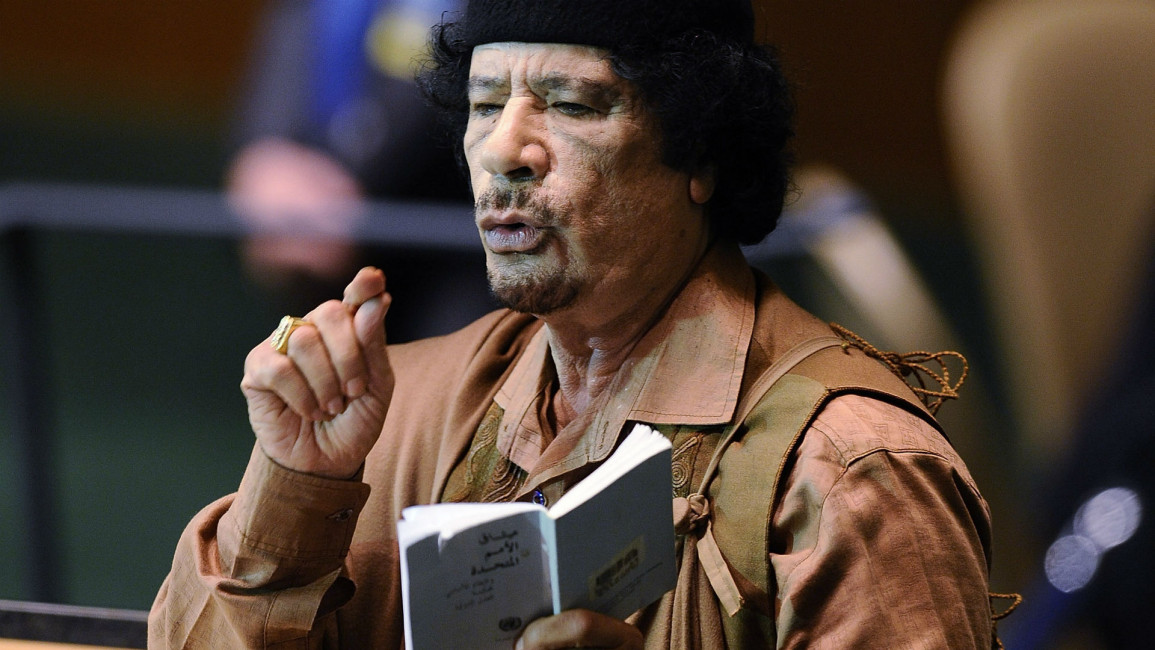
Libya banned from UN voting after non-payment of subs
Libya banned from UN voting after non-payment of subs
After failing to pay $1.4 million in dues to the UN, Libya has been suspended from voting in the General Assembly as a punishment.
2 min read
Gaddafi was fond of delivering rambling speeches at the UN [Getty]
Libya has been suspended from voting in the United Nations General Assembly, according to internal documents from the global body.
UN Tribune, an independent United Nations monitoring website, said that Libya had now been barred from voting in the General Assembly due arrears that "equal or exceeds the amount of the contributions due from it for the preceding two full years".
Libya will have to pay nearly $1.4 million to get back its vote.
Comoros, Somalia and Yemen were "permitted to vote until the end of the current session", the site said, despite also owing back subs.
Five other Arab and Middle East states were in also in trouble with the UN for non-payment of their contributions to the organisation for at least two years, according to a letter sent on 17 January.
The letter was sent by UN Secretary-General Ban Ki-moon to the president of the General Assembly, and was published on the group's website last month.
In it, Ban urged the president to ask countries to at least make minimum payments for the amounts they owed.
Bahrain reportedly owed $745,895, Comoros $873,901, Iran $4,275,520, Libya $1,369,638, Somalia $1,321,917, and Yemen $439,224.
Most of these countries have now made their payments, or in Somalia and Yemen's case, proved they did not have the ability to pay the money.
Libya's UN traditions
One Libyan ruler who never missed paying his UN fees was Muammar Gaddafi.
The dictator had long been known for his extended and eccentric speeches at the United Nations, including a rambling 100-minute address to the General Assembly in 2009.
In it, he broke diplomatic protocol by referring to the US president and "our [Africa's] Obama" during the speech in New York.
By the end of the speech, Gaddafi was mostly complaining about jetlag to a largely empty assembly room.
Gaddafi spent some of his time staying at his bedouin tent, pitched on Donald Trump's estate, before building inspectors threatened legal action unless it was taken down.
Two years later, Gadaffi was overthrown in a popular revolution with NATO backing. Libya was thrown into turmoil for the following five years after war erupted between multiple militias, including the Islamic State group based in Sirte.
The embattled country also has two governments, an Islamist-led parliament in Tripoli and a largely isolated but internationally recognised administration in Tobruk.
Due to the growing threat of extremism in the country, the US and Europe have been eager to get the two warring governments to agree to a unity legislature.
Last month, a UN-sponsored Libyan political agreement was signed, but logistical and political obstacles remain to implementing the power-sharing deal.
UN Tribune, an independent United Nations monitoring website, said that Libya had now been barred from voting in the General Assembly due arrears that "equal or exceeds the amount of the contributions due from it for the preceding two full years".
Libya will have to pay nearly $1.4 million to get back its vote.
Comoros, Somalia and Yemen were "permitted to vote until the end of the current session", the site said, despite also owing back subs.
Five other Arab and Middle East states were in also in trouble with the UN for non-payment of their contributions to the organisation for at least two years, according to a letter sent on 17 January.
The letter was sent by UN Secretary-General Ban Ki-moon to the president of the General Assembly, and was published on the group's website last month.
In it, Ban urged the president to ask countries to at least make minimum payments for the amounts they owed.
Bahrain reportedly owed $745,895, Comoros $873,901, Iran $4,275,520, Libya $1,369,638, Somalia $1,321,917, and Yemen $439,224.
Most of these countries have now made their payments, or in Somalia and Yemen's case, proved they did not have the ability to pay the money.
Libya's UN traditions
One Libyan ruler who never missed paying his UN fees was Muammar Gaddafi.
The dictator had long been known for his extended and eccentric speeches at the United Nations, including a rambling 100-minute address to the General Assembly in 2009.
In it, he broke diplomatic protocol by referring to the US president and "our [Africa's] Obama" during the speech in New York.
By the end of the speech, Gaddafi was mostly complaining about jetlag to a largely empty assembly room.
Gaddafi spent some of his time staying at his bedouin tent, pitched on Donald Trump's estate, before building inspectors threatened legal action unless it was taken down.
Two years later, Gadaffi was overthrown in a popular revolution with NATO backing. Libya was thrown into turmoil for the following five years after war erupted between multiple militias, including the Islamic State group based in Sirte.
The embattled country also has two governments, an Islamist-led parliament in Tripoli and a largely isolated but internationally recognised administration in Tobruk.
Due to the growing threat of extremism in the country, the US and Europe have been eager to get the two warring governments to agree to a unity legislature.
Last month, a UN-sponsored Libyan political agreement was signed, but logistical and political obstacles remain to implementing the power-sharing deal.




